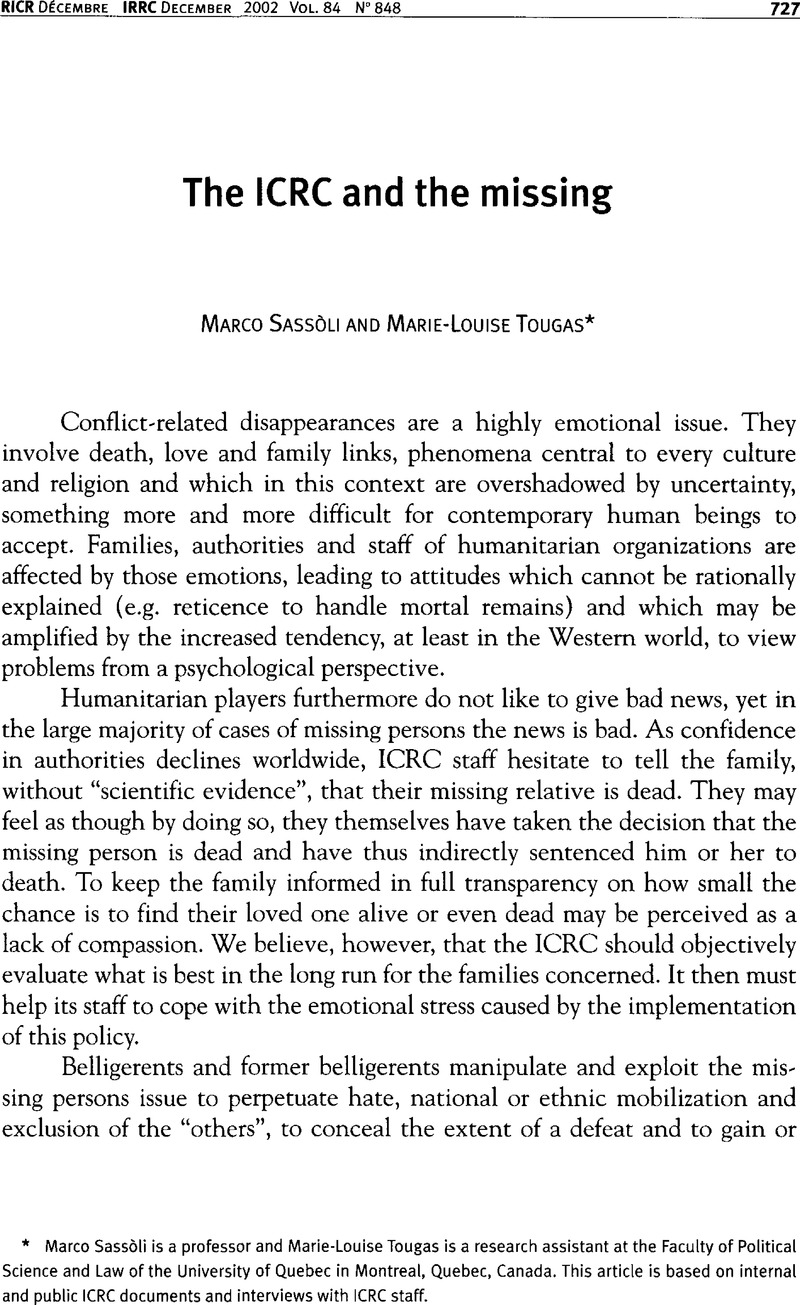Article contents
The ICRC and the missing
Published online by Cambridge University Press: 19 April 2010
Abstract

Information
- Type
- Research Article
- Information
- International Review of the Red Cross , Volume 84 , Issue 848: Missing persons/Personnes disparues , December 2002 , pp. 727 - 750
- Copyright
- Copyright © International Committee of the Red Cross 2002
References
1 During our interviews with ICRC staff no one tried to persuade us that disappearances are found less distressing in some non-Western cultures.
2 Art. 32 of Protocol I.
3 Art. 33 (1) of Protocol I.
4 Arts 25 and 26 of the Fourth Convention.
5 Art. 16 of the First Convention, Art. 19 of the Second Convention, Articles 122 and 123 of the Third Convention, Arts. 136 and 140 of the Fourth Convention, and Art. 33 (2) of Protocol I.
6 Art. 70 of the Third Convention and Art. 106 of the Fourth Convention.
7 Art. 71 of the Third Convention and Art. 107 of the Fourth Convention.
8 Art. 122 (7) of the Third Convention and Art. 137 (1) of the Fourth Convention.
9 Art. 16 of the First Convention and Art. 33 (2) of Protocol I.
10 Art. 33 (4) of Protocol I.
11 Art. 17 of the First Convention and Art. 34 (1) of Protocol I.
12 Art. 34 (2)–(4) of Protocol I.
13 Art. 17(3) of the Third Convention.
14 See Rona, G., “The ICRC's privilege not to testify: Confidentiality in action”, Revue Internationale de la Croix-Rouge/International Review of the Red Cross, Vol. 84, No. 845, 03 2002, p. 207 ff.CrossRefGoogle Scholar
15 Ireland, Marie, Apprivoiser le deuil, Presses du Châtelet, Paris, 2001, p. 238.Google Scholar
16 Ariès, Philippe, The Hour of Our Death, Oxford University Press, New York, 1991Google Scholar; Thomas, Louis-Vincent, Rites de mort, pour la paix des vivants, Fayard, Paris, 1985.Google Scholar
17 Respectively Art. 124 of the Third Convention and Art. 143 of the Fourth Convention.
18 Art. 3 common to the four Geneva Conventions of 1949.
19 See e.g. ICRC Annual Report 2001, ICRC, Geneva, p. 265Google Scholar (Macedonia).
20 See e.g. ICRC Annual Report 2001, p. 82Google Scholar (Congo), p. 98 (Guinea), p. 106 (Rwanda) and p. 112 (Sierra Leone).
21 See e.g. ICRC Annual Report 1995, p. 179Google Scholar ff. (former Yugoslavia); ICRC Annual Report 2000, p. 115Google Scholar ff. (East Timor); ICRC Annual Report 2001, p. 255Google Scholar (Albania).
22 ICRC practice in a recent conflict is described in Thierry Schreyer, “L'action de l'Agence centrale de recherches du CICR dans les Balkans durant la crise des réfugiés kosovars”, International Review of the Red Cross, Vol. 82, No. 837, 03 2000, pp. 49–65.Google Scholar
23 For details, see Sassòli, Marco, “The National Information Bureau in aid of the victims of armed conflicts”, International Review of the Red Cross, No. 763, 01/02 1987, pp. 6–24.Google Scholar
24 See de Chazournes, Laurence Boisson and Condorelli, Luigi, “Common Article 1 of the Geneva Conventions revisited: Protecting collective interests”, Revue Internationale de la Croix-Rouge/International Review of the Red Cross, Vol. 82, No. 837, 03 2000, pp. 67–88.Google Scholar
25 See ICRC Annual Report 1996, p. 173 ff.Google Scholar
26 See e.g. ICRC Annual Report 1996, p. 175Google Scholar, and ICRC Annual Report 1997, p. 187Google Scholar (former Yugoslavia).
27 See Rona, , op.cit. (note 14).Google Scholar
28 The ICRC has already recommended that an international network of forensic scientists be established to work on behalf of missing persons. See The Missing: ICRC Report (Summary of the conclusions arising from events held prior to the international conference of governmental and non-governmental experts), 19–21 February 2003, p. 65.Google Scholar
29 See ICRC Annual Report 1991, p. 102Google Scholar (after the 1990–91 Gulf War) and ICRC Annual Report 1997, p. 185 ff.Google Scholar (following the Dayton-Paris Agreement).
- 10
- Cited by

